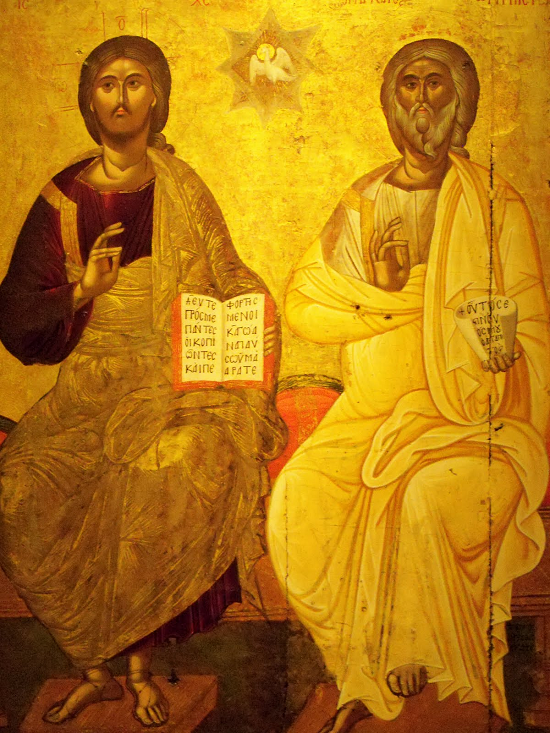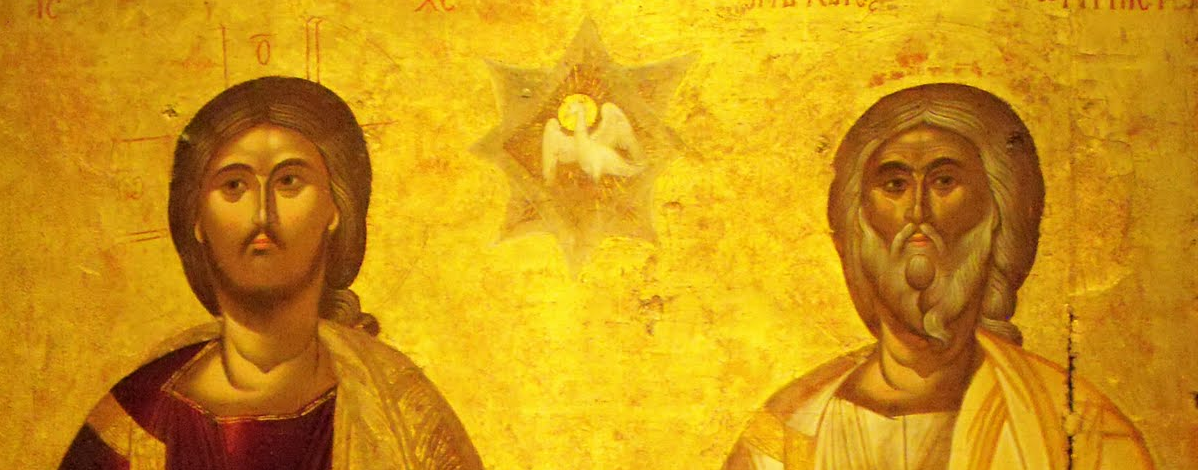The Living Power of Love
Trinity Sunday Scripture Readings

We start off life as children, looking with anticipation and longing toward that magic number—whichever it may be, eighteen or twenty-one—when we’ll finally be adults and fully invested in adult privileges. We celebrate when we achieve that milestone. At long last, we’ve arrived. Only slowly does it dawn on us that, along with the privileges come responsibilities until that day comes when we look back on the irresponsibility of childhood with nostalgia.
Regardless of our physical age, we people of faith claim the title of “children of God.” Yet, like newly-minted adults, we only come to appreciate the full import of that title slowly, over time. Our relationship with God goes far beyond that of the Creator to his creatures. If we are God’s children and not just products of his creative power, then he must be a parent to us. We mustn’t let ourselves get distracted by debates about the “fatherhood” of God versus the “motherhood” of God. That’s right … the motherhood of God. Throughout our Scriptures, we hear about the “loving-kindness” of our God. That term in Hebrew is חֶסֶד (ḥesed), referring to the unique, tender love a mother has for her child. No. Fatherhood and motherhood are human experiences we project onto the parenthood of God to help us understand and appreciate it in human terms.
As parent, God not only cares for his children, but never ceases speaking to them—to us. What he speaks to us is himself. Imagine what it would be like to have that power—to say the word “bread,” and there’d be a loaf. God has only one word and that one word contains all that God is. When that word is spoken, it communicates the essence of all God is to us. God speaks himself. “In the beginning was the Word and the Word was with God and the Word was God.” [John 1:1] And the Spirit of God hovered over the waters of nothingness and God spoke, “Let there be light.” [Genesis 1:3] The whole of who God is is speaking in and through creation and has been since the beginning of time.
God speaks in slow motion, that is, in time. He speaks through time because that’s the only way we, God’s children, can hear him. God’s never been silent; God’s never held back. It’s we, God’s children, who hear only slowly, over time. God’s Spirit—God’s life-force—is never inert. Through the power of God’s Spirit, his Word becomes flesh and dwells among us. His Word has never dwelt anywhere else but among his children. As we encounter God’s Word dwelling among us, we learn that it’s not only a creative Word, not only a life-giving Word, but it’s a loving, forgiving, restoring, and reconciling Word.
And so, there you have it: the Speaker, the Spoken, and the Speaking—the Father, the Son, and the Holy Spirit. Even if that makes sense to us, we can’t fully comprehend what our God has done. In our second reading, Paul says, “… you received a Spirit of adoption, through which we cry, ‘Abba, Father!’” We are given a share of the Spirit which brings all things into existence, the Spirit that gives life, the Spirit that brought to birth the Savior and raised him from the dead, and the Spirit that raises us up with him. Paul continues. “… we are children of God, and if children, then heirs, heirs of God and joint heirs with Christ.” We are co-heirs with Christ. That means that we share the same Spirit. We literally have been grafted onto the Holy Trinity.
In today’s gospel reading, Jesus says to his disciples, “All power …” yes all power “… in heaven and earth has been given to me.” What he doesn’t say is, God has given that same power to you so that you can “… make disciples of all nations, baptizing them in the name of the Father and of the Son, and of the Holy Spirit.” What does it mean to be baptized in the name of the Father, Son, and Holy Spirit? It’s a real, although symbolic, immersion into the Trinity itself. Just as Jesus, the Eternal Word, communicates the essence and entirety of the Father into the heart of God’s creation, through baptism into the Trinity, that becomes our mission, as well. That’s the authentic meaning of “make disciples of all nations.”
Through our faith in the Trinity and our trust in the power of our loving God, we complete God’s plan for creation. By creating humankind, God finalized the chasm he instituted between his infinite Being and everything else. All God’s creatures evolve as he created them. They cannot be otherwise. All except humankind, that is. In all of creation, humanity alone has the power to deny God and deny itself. It had to be this way because, without the power to deny, the power to love couldn’t exist. Love is nothing if we have no other choice.
And that’s where our mission comes in. When we love as Jesus loved, we bridge the chasm between diversity and unity, between individuality and infinity, between all of creation and God. We serve as the conscience of the universe, reuniting creation with the Creator, not by necessity or by force, but out of love and gratitude. In a mystical but very real sense, by our love, we make God whole again by reuniting with him his alienated creation. When we love as Jesus loved, we love with the creative power of God.
That’s what Jesus was telling his disciples when he said, “… teach them to observe all I have commanded you.” Jesus’s commandments aren’t like the stipulations of the Covenant—rules and regulations that need to be followed—but they consist of the adoption of a way of life based, as Jesus’s was, on selfless love of God through love of others. Because we love as Jesus did, with and through the power of the Holy Spirit, the risen Jesus lives in and through us. Our love is the communication of the Father to the world—that is, the Word made flesh in us. It’s our love, given life by the power of the Holy Spirit, that enables Jesus to declare, “… behold, I am with you always, until the end of time.”
Get articles from H. Les Brown delivered to your email inbox.
